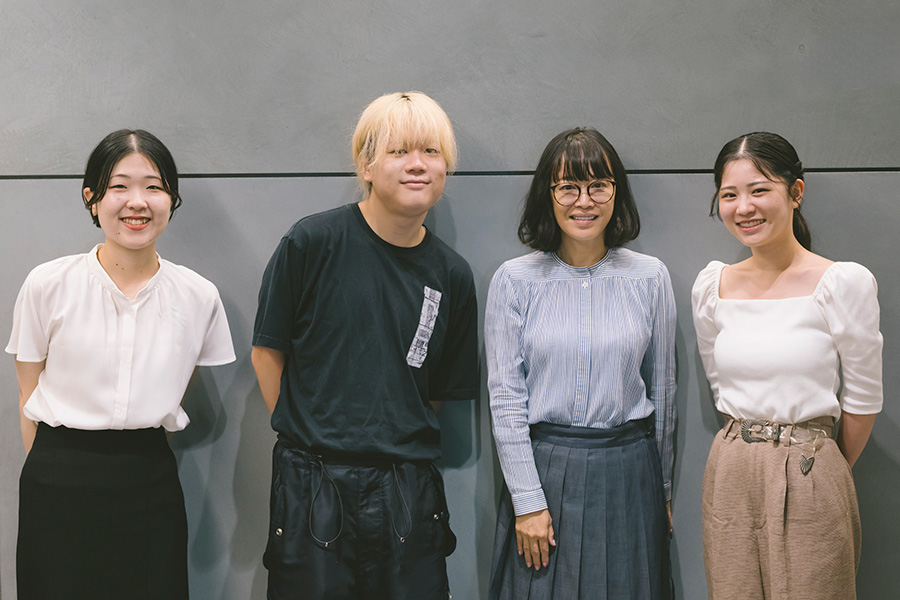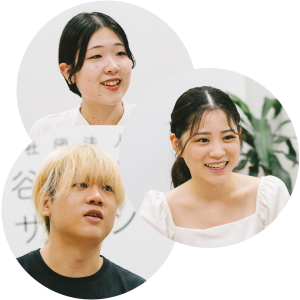立ち上げから6年目となる渋谷未来デザイン(FDS)、今年度はインターンの学生のみなさんを迎えて、お互いに刺激を受け合っています。今回は彼らが自らインタビュアーとなり、彼らならではの視点からFDS事務局長・長田に取材を敢行。渋谷未来デザインに対する基本的で素朴な疑問など、自由にぶつけてもらいました。
※以降本文の記事制作はインターン学生本人が行ないました
– 1 –
渋谷未来デザインの仕組み/社会で活躍できる女性リーダーになるには
インタビュアー:永沼理奈
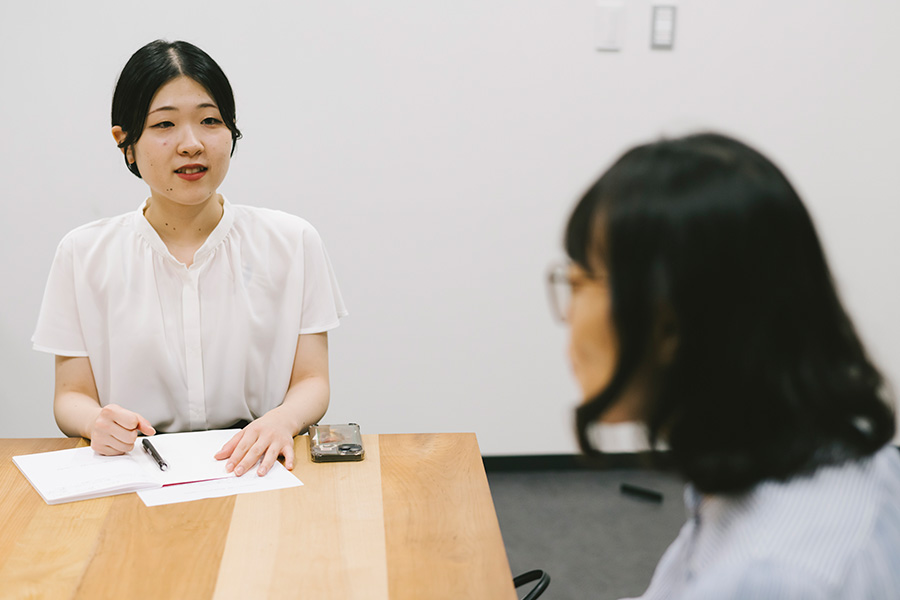
永沼 本日はよろしくお願いします。はじめに、FDSだからこそできることや、強みをお聞きしたいです。
長田 行政と個別企業が直接的にやりとりをする機会を作って価値を出すということは簡単ではないので、両者と同じ言語で直接対話できることやコーディネートできることが我々の強み。
そもそも、行政が主体的にFDSを立ち上げたということ自体がユニークで、行政のリソースと連携できる土台があるじゃないですか。これも行政外郭団体というFDSにしかできないことなのかな。、渋谷というフィールドで、官民連携事業が私たちが行政と企業をつなぐことでどんどん生み出されていくことで、社会がよくなり、我々の存在意義が証明されていく、がそれが私たちの強みかなと思っています。
あともう1個面白いことが、皆さん、区役所とかこういう行政と直接話をしたことはありますか。自分の地元とか。
永沼 マイナンバー作るときとか。住民票とか。
長田
そういう手続きで行く用事以外では、区役所のことって実は意外と分からないじゃないですか。だけど、実は自分の生活に関わる全ファンクションがあそこにあるんです。
イノベーションを生み出す仕組みみたいなものが、実はすごく面白くて、皆さん、企業にいると気づかないんだけど、実はこういうふうに活用したらいいんだな、みたいなことが見えてくるというのもFDSの強みなんです。なぜなら渋谷区の職員や住民もこの組織の中にいたりとかなり多様なチームなんです。
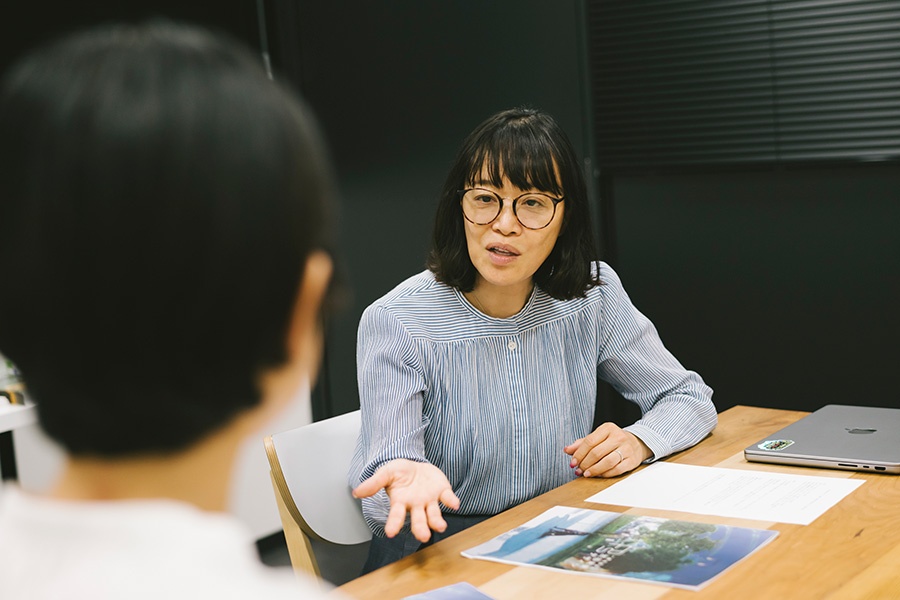
永沼 続いて、FDSのビジネスモデルについて教えていただきたいです。
長田 確かに分かりづらいですよね。まず、この組織って製品とか持ってないんです。だから、何か物やサービスでお金を稼ぐということはしていなくて、基本的には企業からの会費で運営されてます。渋谷の社会課題を一緒に解決したい、一緒に何かをしたいという方たちがパートナーになって入っていただいて、年会費をいただくというのが1つ目です。
もう1つは、一緒に事業をつくって、それを継続的に運営していくかたちで投資をしてくれるパートナー企業さんと事業を拡大させていくというのが2つ目。
3つ目はいわゆる助成金で、SOCIAL INNOVATION WEEKだったり、スポーツのNext Generationsだったり、子ども第三の居場所「みらいの図書室」のように日本財団さんや国などから助成金をいただいて、事業やプロジェクトを運営していくかたちがあります。
永沼 ありがとうございます。話は一転するのですが、今、女性の活躍推進というのが社会的に話題になっているなかで、長田さんの考える「女性リーダー」として必要なことについてお聞きしたいです。
長田 まず、社会や環境という軸と個人という軸との2つがあると思っていて、まず環境の軸で言うと、根本的に女性を取り巻く社会的環境が男性とは違うということを企業の経営陣が理解して、環境を整えるということを社会全体でやっていくというのはもう大前提だと思っています。そうでないと、例えば結婚して子どもを産みたい、育休を取りたいとか、あるいは女性特有の健康課題に直面したときに、それによって自分の役職がステップダウンしちゃうとか、上に上がれないとか、今までってそういう不利な環境が女性の側に多くあったわけですよね。
もう一方で、個々人の課題として、女性リーダーになるために、男性と“戦う”必要まではないにせよ、やっぱり責任を持つというマインドセットは必要だと思っています。本当の意味でリーダーになるためには、きちっと自分が責任を持ってこのチームを引っ張っていく考えや意志を持つべきだなと思うので、社会や環境の軸と、個々人の軸、その両軸が必要なのかなと思うんです。
Z世代をはじめ若い世代の皆さんの意識は、以前と比べたらすごく高いと思います。自分でこう変えたいとか、こういうふうにしたいという思いを持たれている方もいらっしゃると思うので、それをもっと自分から発信したり、あとは社会との接点を持つことも大事。今、大人って実は若い皆さんの意見を欲していて、すごくよく聞いてくれるはずです。このチャンスをどんどん活かしていくべきだと思います。学生と会社員との間の溝が埋まってきて、今は本当に皆さんが出したアイデアを社会で実践していける時代に生きてるから、それをどんどん活用するのをおすすめします。今からネットワークつくっていた方が将来必ず役に立ちます。
永沼 なるほど。
長田 何らかのときに声をかけたりお願いができたり、そういうことができるつながりをつくっていけると、絶対後で何かで活かされるときが来ると思う。
永沼 ありがとうございます。
– 2 –
マーケティング視点で考えるまちづくり/長田さんが考える“いいまち”とは?
インタビュアー:髙木麻衣
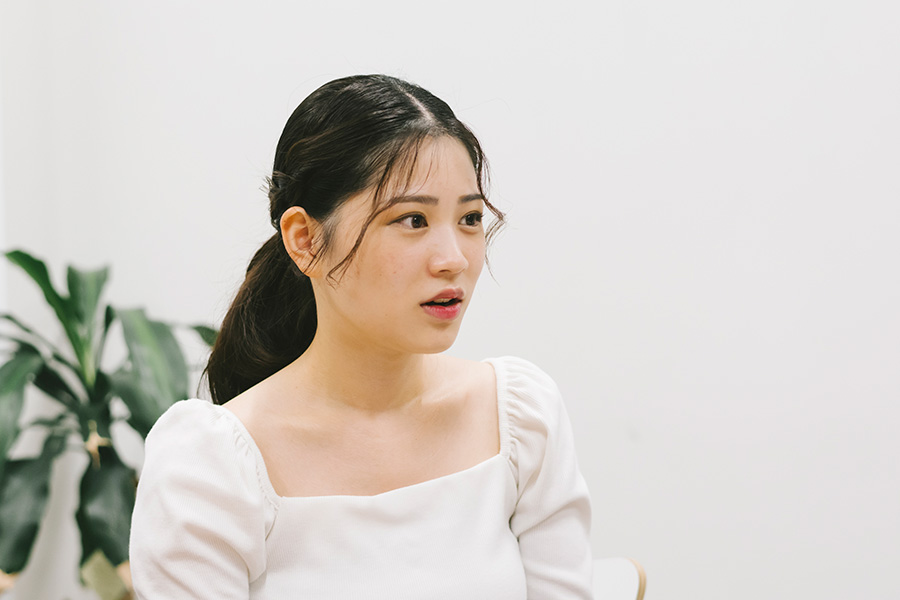
髙木 よろしくお願いします。私は、FDSの内部にはどんな方がいらっしゃるのかが気になっていたので、長田さんご自身についてのお話をお伺いしたいです。まず、学生時代はどんなことをなさっていたんですか?
長田 大学は英文学科みたいなところにいました。元々、英語とか海外の音楽、映画、アートとか色んな文化がすごく好きで。なので、自分が英語を学んでそういうところでコミュニケーションしたいとか、そういう意味では割と海外志向的な人でした。
あんまり勉強はしてなかったけど、バイトとかは結構やってて。だから本当に色んなところで大人と接点を持つような生活でした。で、学生時代に毎年、留学をしてたんです。
髙木 毎年ですか?
長田 毎年。夏休みはほぼずっと留学をして、最終的には就職をせずに海外に行きました。大学を卒業してそのまま留学したのでいわゆる就活というものはやっていなくて。
帰ってきても仕事はなかったんだけど、ふらふら語学学校とかに通いながら、そこにあった張り紙を見てとりあえず面接を受けたら、アメリカの企業にどうぞって言われて入ったという感じ。だから、皆さん仕事辞めたりとかしてもたぶん次の仕事は見つかるので大丈夫ですよ。
髙木 就活や今の仕事に囚われすぎる必要はないんですね。長田さんはマーケティング職をされていたとお聞きしたのですが、まちづくりにお仕事を変えられたきっかけはなんですか?
長田 元々はマーケティングじゃなくて事業部長のアシスタントからスタートして、その後、営業職もやってからマーケティングに異動というか、だんだんシームレスに始めた感じです。
そこからまちづくりに来たきっかけは、まず自分は日本の何かに貢献したいという軸を持ってました。あとは、こういうまちづくりとか行政ってマーケティングという発想がそもそもないんです。だけど本当は、まちをブランドと捉えたら、このまちの魅力をどうやって広めていくか、どうやってもっとファンになってもらうかって、マーケティングの原理と一緒なんです。ここに住んでくれる人や関係してくれる人を増やして、このブランドを世界に打ち出すためにはどういう方法でコミュニケーションしたらいいのか、という。そう考えると、まちづくりって今は機能的にはマーケティングがないけれども、これからの社会においては、それぞれのまちがシティマーケティングをしていくのはとても大事なことなんじゃないかなと思って、いまここにいます。
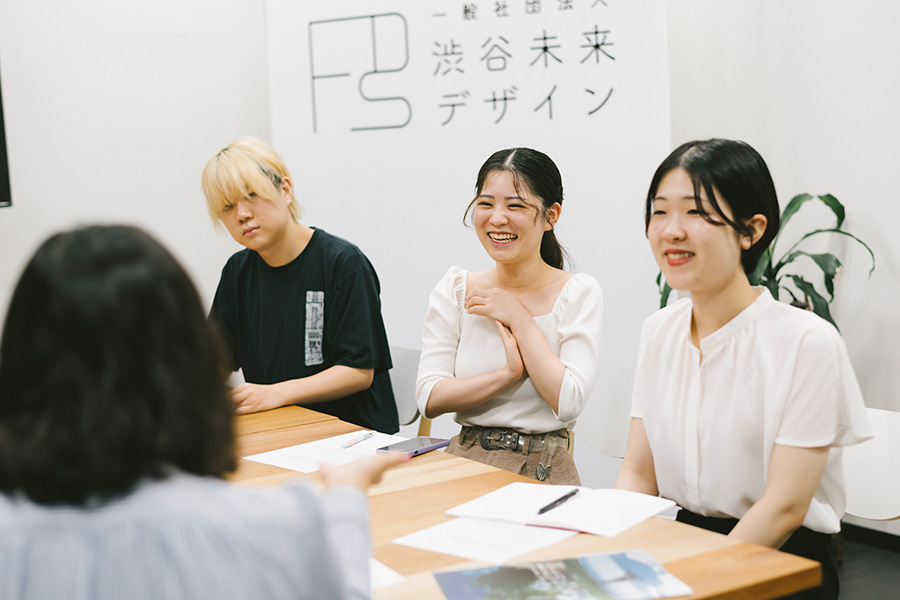
髙木 なるほど、まちづくりにもマーケティングが必要なんですね。そしていま、事務局長としてまちづくりに取り組まれている長田さん自身が考える“いいまち”って、具体的にどのようなものですか?
長田 やっぱり、そのまちのことを考える人がたくさんいるというのがいいまちだと思っています。渋谷に来たときにすごく感じたのは、渋谷ってこうあるべきだ、渋谷はこうしたいよね、とかっていう人がすごくたくさんいたんです。私はそれをシティプライドと言うんですけど、そういう思いを持った人たちがたくさんいるまちって、とても幸せなまちだなと思っています。
髙木 そうですね。私も自分の大学が渋谷にあることを誇らしく思っているので、なんとなく分かる気がします。ところで長田さん以外にもFDSには様々なメンバーがいらっしゃいますが、多様性が溢れる中で、共通してることってあったりしますか?
長田 共通してることは、やっぱりみんな渋谷を変えたいとか、渋谷をなんとかしたいとか、あるいはもっと社会を良くしたい、みたいな気持ちは全員あると思います。FDSってとりわけお金儲けをするという組織ではないから、ある意味で社会に対して何かしたいという想いを持ってないと正直続かないと思います。なので、渋谷が好きでここから何かをやりたいみたいな気持ちはたぶんみんなありますよね。
髙木 皆さん渋谷に愛がある方が集まっているんですね。
長田 渋谷に愛がないと渋谷未来デザインに来ないと思う。
髙木 そうですよね。正直ネットで調べただけだと実際どんな方が、どんな思いで渋谷を変えていこうとしているのかわからなかったので、今日お話を聞けてよかったです。
長田 髙木さんもふくめて皆さんもうその一員なので。だからここで得た経験をぜひ就活やこれからの活動に活かしてもらえるときっと楽しいと思います。
髙木 頑張ります。ありがとうございました。
– 3 –
ミクロとマクロ、リアルとメタバース…まちのカルチャーを育む横断的な視点
インタビュアー:花田拓海
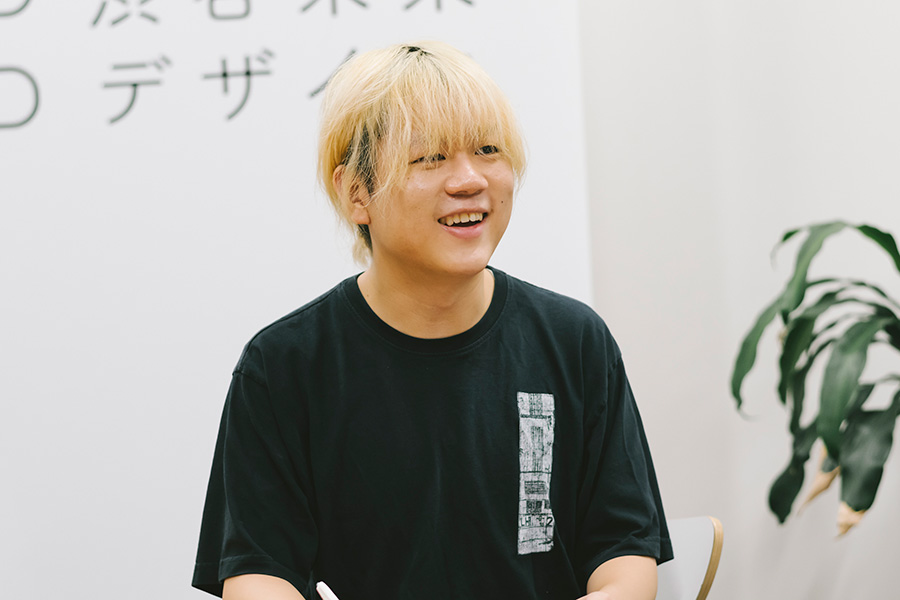
花田 僕はインターンという形でFDSに入らせていただいたのですが、想像より横断的に大きなことされていて、片や、公園のことから、カーボンニュートラルで2050年までどうしましょうみたいな。そういった中で、ミクロな視点というのはどれぐらい持っているのかお聞きしたいです。
長田 カーボンニュートラルのプロジェクトなどはもちろん大きなビジョンのもとに進んでいくものですが、でも実際に日々やってることとなると、結構ミクロなことが多いんです。
例えばササハタハツまちラボのようなプロジェクトだと、市民の皆さんと共創しながらまちをどう変えていくのかを具体的にしていくので、地道とも思えるようなイベントやコミュニケーションなどを重ねていって、それがちょっとずつでも住民の皆さんの意識を変えたり、環境が変わっていったりというようなことを、実験しながらやっています。
そういうことをやりながらも、大きなビジョンを立てることは大事で、それを実際に落とし込んでいく中ではミクロな視点での活動の積み重ねになってくるというのは、どのプロジェクトにおいても比較的共通していることじゃないかと思います。
花田 住民や来街者の意識や環境の変化ということでいうと、渋谷のまちが生むカルチャーというのも常に変化していきますよね。たとえば昔の渋谷、特にセンター街に代表されるようなところでいうとある意味ダーティな雰囲気があって、でもその頃のほうが個性的なカルチャーを生んでいたようにも感じるんですけど、今のクリーンな渋谷と比べて長田さんはどう感じているか聞きたいです。
長田 昔の渋谷は危ない感じの雰囲気とかがあって、でもそこに魅力を感じる人が集まるというところがあったけれど、時代の流れ的に、安心安全とかっていう方向に向かっていて、それも時代の流れの中で当たり前なことなのかなと私は思っています。ただ、無くしちゃいけないと思っているのは、若い人だったり、何かを成し遂げたい人が、自由に挑戦できる雰囲気がこれまでの渋谷にはあったし、それがなくなってしまうと、ほかのまちと変わらないまちになってしまう可能性があるなと思っています。なんでもかんでも禁止して何もできなくなると、そこからはカルチャーは生まれてこないと思います。
花田 では、渋谷からカルチャーが生まれ続けていくためには、もっとどうしていったらいいですかね。
長田 カルチャーって難しいなと思っていて、音楽とかファッションとかそれ自体がカルチャーなわけではなくて、それを取り巻くたくさんの人の行動なんかも含めてカルチャーとして醸成されていくわけですよね。コミュニティというか、何かムーブメントが進んでいくときの集まり全体みたいなものがカルチャーになっていくような…。
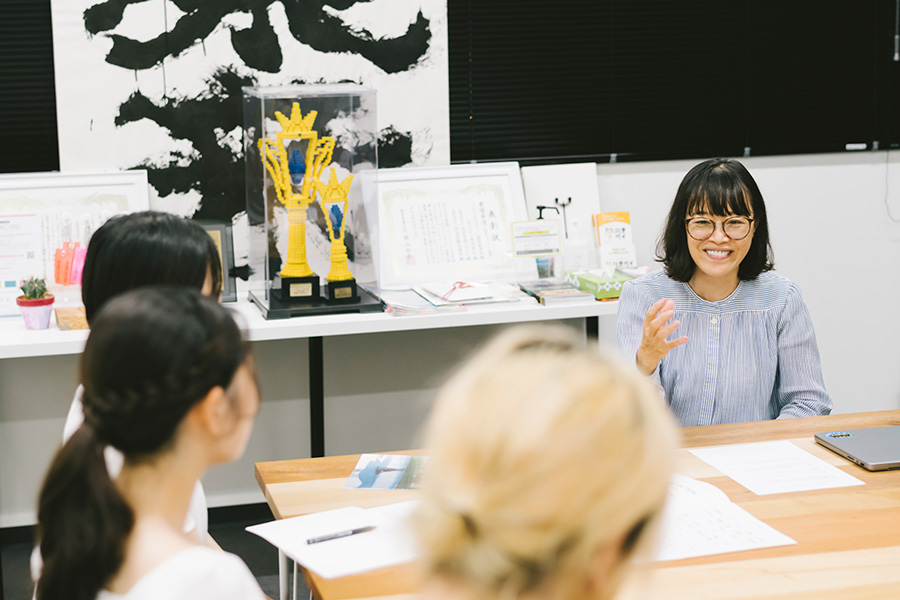
長田 この前、面白い話を聞いたんですが、ギャルっていうのもひとつのカルチャーとしてあるじゃないですか。
花田 いわゆる渋谷のギャル?
長田 そうです。ギャルって元々渋谷にいたじゃないですか。だけど今、ギャルはあまりいなくなったと思っていたらそういうわけじゃなくて、SNS上にたくさんいますよって言われたんです。でもギャルの人たちは渋谷は好きで、SNSだけでは十分にコミュニケーションできないから、街に来るとしたら渋谷なんだ、っていう話を聞きました。やっぱり、人のコミュニケーションってネットの世界だけで完結しないんですよね。だから、アイデアはネット上から出てくるかもしれないけど、それを発展させていくためには、人と集まったり、リアルで何かを一緒につくったりということが必要なんだと思います。
花田 リアルとネット世界というところでいうと、FDSではメタバースについて早くから取り組まれていたと思うんですが、長田さんはメタバースというものにどのような可能性を感じていますか?
長田 人って誰しも二面性があるもので、リアルな自分ともうひとつ、アバターという人格を持つことはあまり難しくないと思っています。いま既にメタバースのなかで楽しんでいる人たちは、とても生き生き活動してるんですよね。男性が女性の姿になって過ごしている人が結構多かったりとか。普段の生活ではできない新しいコミュニケーションや体験をメタバースでやることで生活が充実する、っていうのはとてもいいなと私は思っています。
もうひとつ、多様性の観点でいうと、今までコミュニケーションがとりづらかった、例えば障害者の方とか引きこもりの方とか、そういう人たちがメタバースのなかで一緒に何かを学んだり体験したりできるという部分には大きな可能性を感じています。メタバースだとみんなお互い平等にコミュニケーションできる。そういう空間としても発展していくといいなと思っています。
花田 最後に、これは我々インターン3人からの質問になるんですけど——長田さんは既存のものを活かしていくだけではなく、新しいものをつくり続けているという印象があります。そういうことに対してはどんな思いがありますか?
長田 いまの時代って、1つの企業とか組織だけじゃ新しいものって生まれないと思っているんです。そういう意味では我々みたいな、いろんな立場の企業や組織をまとめて、イノベーションを生み出していく団体というのは、ニーズが高まっていると思っています。個々の企業が持っているものを組み合わせれば、もっと面白いものがつくれるということはいっぱいあります。そんなことをどんどん生み出していくことにはすごく興味があります。
それをこの渋谷から行なって、さらにその渋谷のロールモデルが他の地域にインストールされていくことを目指しています。
もちろんそれは私だけじゃなくて、皆さんが違和感を感じていること、もっとこうなったらいいのにと思うことが、社会を変えていく種になります。そういう種を持ち寄って議論するのが、今年も11月に開催するSOCIAL INNOVATION WEEKですね。
だから学生の皆さんが違和感を感じていることとか、もっと面白くしたいと思うことをどんどんぶつけ合って、ここにいる3人からもどんどん種を蒔いてもらいたいんです。
花田 なるほど。そこから生まれていくことにすごく可能性を感じます。ありがとうございました。
長田 ありがとうございました!
